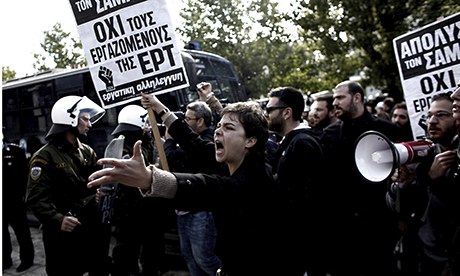Richard Simcox theguardian.com, Tuesday 12 November 2013
The closure of the state broadcaster by the coalition government is symptomatic of the brutal austerity being inflicted
A demonstrator shouts at riot police in protest at the closure of Greek former public broadcaster ERT. Photograph: Angelos Tzortzinis/AFP/Getty Images
Last Monday Panagiotis Kalfagiannis, the leader of Greek media workers' union Pospert, told me and a dozen colleagues that the government was "using all its state apparatus" against the journalists occupying the headquarters of public broadcaster ERT. Less than 72 hours later the building had been raided by riot police, Kalfagiannis was in custody and the screens went blank for the first time in the five months since the station was shut down by ministers.
We – a group of journalists who work for trade unions from as far afield as Ghana, the USA and Lithuania – were in Athens on a week-long project and were the last people to interview ERT staff from inside the vast broadcasting centre before their eviction.
One of the spokeswomen for the occupation, TV journalist Mahi Nikolara, told us that they felt the ruling coalition, which lost a partner when Democratic Left walked away in protest at the ERT closure, would be forced to come up with a political solution, because the decision to pull the plug had itself been political. Little did we know the government would act quite so soon.
It was not, of course, the desired outcome for the workers or the many hundreds of protesters outside of the building during the dawn raid and thousands more who gathered later that evening. I was among them and the mood was calm, but very angry. Cheers rang out when a speaker announced that Syriza had that evening tabled a motion of no confidence in the government that was, as expected, defeated in the parliament on Sunday night after tense exchanges.
With economic and social policy being dictated by the hated troika – Greece's three international creditors (European commission, the International Monetary Fund, and the European Central Bank) imposing brutal austerity in return for loans – the future of politics in the cradle of democracy is almost impossible to call. For many, ERT has become a symbol of what is happening across Greece. While the government has accused the broadcaster of being bloated and corrupt, the workers there say that the only high salaries were being paid to the 100 or so government-appointed staff.
You would be hard pushed to find anyone in Greece who thought that their economy and political system were in good health before the crisis. But no one I spoke to thought they were being anything other than destroyed by the troika and, crucially, they expect – many even accept – things are only going to get worse.
Many of national statistics are well known in the UK: unemployment soaring from 7.5% in 2008 to 27% in the first quarter of this year; youth unemployment at a devastatingly bleak 62%; cuts to the education budget of 45%; health spending slashed by 50%; local authorities losing 55% of their funding from government.
Many other effects are not well known. We spoke to workers from the public works ministry who told us the department responsible for post-natural disaster restoration was being abolished. This in a country ranked fifth in the world for earthquake activity.
We heard account after account of devastating cuts that, I believe, amount to nothing less than criminal acts against the people of Greece. Added to the immediate impact, professionals talk about looming environmental and health problems that will be felt for many years to come. Some doctors predict a mortality crisis will take hold after 2016.
When I arrived outside ERT for the protest on Thursday evening, Guardian contributor Aris Chatzistefanou – who was working with us for the week – told me the ERT workers were trying to set up a mobile studio. They succeeded, and that night their news bulletin was reportedly watched by more than 1.2 million people online – seven times more than their average ratings than before the police raid.
The national broadcaster may yet have been thrown itself a lifeline. It remains to be seen whether the Greek people can do the same.
![The [Greek] European Tragedy](https://blogger.googleusercontent.com/img/b/R29vZ2xl/AVvXsEiWKI5s90SFm1wWTk6bs4p7CgslaC2SnYPsrZhb-B-smOufNNCSxCvpBLI9hOB-LsXZjir_PNmEiMk2-E62F3xkg96IoC6QFAaZAnPRTVH340IN9WBRmWJqPkjWlgyRj3zpALp7h6hvA58/s920/GkBack_new.jpg)

